Resources
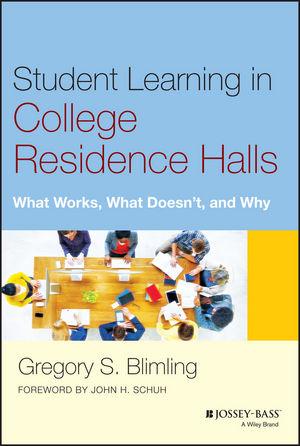
Click Here for Book Review Abstract: Grounded in current research and practical experience, Student Learning in College Residence Halls: What Works, What Doesn't, and Why shows how to structure the peer environment in residence halls to advance student learning. Focusing on the application of student learning principles, the book examines how neurobiological and psychosocial development influences how students learn in residence halls. The book is filled with examples, useful strategies, practical advice, and best practices for building community and shaping residential environments that produce measureable learning outcomes. Readers will find models for a curriculum-based approach to programming and for developing student staff competencies, as well as an analysis of what types of residential experiences influence student learning. An examination of how to assess student learning in residence halls and of the challenges residence halls face provide readers with insight into how to strategically plan for the future of residence halls as learning centers. The lack of recent literature on student learning in college residence halls belies the changes that have taken place. More traditional-age students are enrolled in college than ever before, and universities are building more residence halls to meet the increased demand for student housing. This book addresses these developments, reviews contemporary research, and provides up-to-date advice for creating residence hall environments that achieve educationally purposeful outcomes. • Discover which educational benefits are associated with living in residence halls • Learn how residential environments influence student behavior • Create residence hall environments that produce measureable learning outcomes • Monitor effectiveness with a process of systematic assessment Residence halls are an integral part of the college experience; with the right programs in place they can become dynamic centers of student learning. Student Learning in College Residence Halls is a comprehensive resource for residence hall professionals and others interested in improving students' learning experience. (From the Publisher)
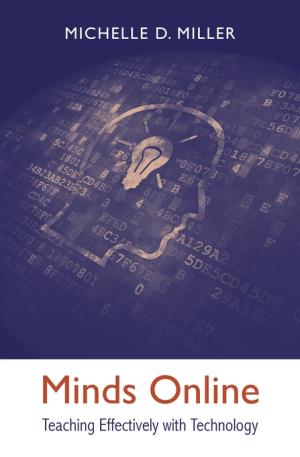
Click Here for Book Review Abstract: From wired campuses to smart classrooms to massive open online courses (MOOCs), digital technology is now firmly embedded in higher education. But the dizzying pace of innovation, combined with a dearth of evidence on the effectiveness of new tools and programs, challenges educators to articulate how technology can best fit into the learning experience. Minds Online is a concise, nontechnical guide for academic leaders and instructors who seek to advance learning in this changing environment, through a sound scientific understanding of how the human brain assimilates knowledge. Drawing on the latest findings from neuroscience and cognitive psychology, Michelle Miller explores how attention, memory, and higher thought processes such as critical thinking and analytical reasoning can be enhanced through technology-aided approaches. The techniques she describes promote retention of course material through frequent low‐stakes testing and practice, and help prevent counterproductive cramming by encouraging better spacing of study. Online activities also help students become more adept with cognitive aids, such as analogies, that allow them to apply learning across situations and disciplines. Miller guides instructors through the process of creating a syllabus for a cognitively optimized, fully online course. She presents innovative ideas for how to use multimedia effectively, how to take advantage of learners’ existing knowledge, and how to motivate students to do their best work and complete the course. For a generation born into the Internet age, educational technology designed with the brain in mind offers a natural pathway to the pleasures and rewards of deep learning, (From the Publisher)
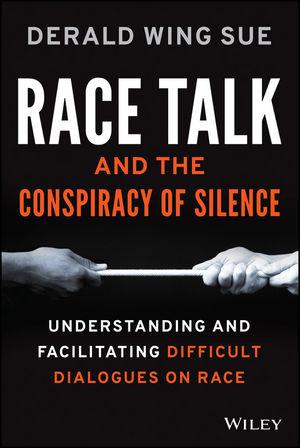
Click Here for Book Review Abstract: Learn to talk about race openly, honestly, and productively Most people avoid discussion of race-related topics because of the strong emotions and feelings of discomfort that inevitably accompany such conversations. Rather than endure the conflict of racial realities, many people choose instead to avoid the topic altogether, or remain silent when it is raised. Race Talk and the Conspiracy of Silence: Understanding and Facilitating Difficult Dialogues on Race puts an end to that dynamic by sharing strategies for smoothing conversations about race in a productive manner. A guide for facilitating and participating in difficult dialogues about race, author Derald Wing Sue – an internationally recognized expert on multiculturalism, diversity, and microaggressions – explores the characteristics, dynamics, and meaning behind discussions about race as well as the hidden "ground rules" that inhibit honest and productive dialogue. Through emotional and visceral examples, this book explains why conversations revolving around racial issues are so difficult, and provides guidelines, techniques, and advice for navigating and leading honest and forthright discussions. Readers will develop a stronger ability to build rapport with people unlike themselves, and discover how not talking about race impacts society as a whole. • Overcome and make visible the fears associated with race talk • Learn practical ideas for talking openly about race • Facilitate and navigate discussion with expert strategy • Examine the hidden rules that govern race talk • Understand the benefits of successful conversations Discussions about race do not have to result in disastrous consequences, and can in fact be highly beneficial to all parties involved. It's important that people have the ability to converse openly and honestly with their students, colleagues, children, and neighbors, and Race Talk provides the path for achieving this goal. (From the Publisher)

Click Here for Book Review Abstract: Out of over 40 years of experience in adult or worker education, David Greene brings us tools to develop consciousness and leadership for social change. Based on the power of our huge working class to understand this economic system and to organize, this book aims to empower educators, students and other workers with science applied to solving the serious social problems we face today. We are confronted with the issues of low-wage, part-time and temporary jobs, inadequate housing, health care, and transportation, inequality and injustice, at the same time as the greatest concentration of wealth in human history. The disparity of wealth and control has never been greater. The only way out of this deepening crisis is through education. To change this we need understanding that is based on the clearest reflection of the real world. Unfit to Be a Slave employs the tools of theory and informed practice, to guide us to create spaces to share experience, study history’s lessons and develop consciousness. As a collective and organized force we can transform our communities, our countries and our world. Mythologies that tell people, ‘Things don’t change,’ ‘We can’t do anything,’ or ‘It has always been this way,’ prevent poor and working class populations from taking necessary action on behalf of their own lives and families. Unfit to Be a Slave is meant to be a guide to education for social change. (From the Publisher)

Click Here for Book Review Abstract: Returning seven years later to their original pieces from this landmark book, over 20 leading scholars and activists revisit and reframe their rich contributions to a burgeoning scholarship on Whiteness. With new reflective writings for each chapter, and valuable sections on relevant readings and resources, this volume refreshes and enhances the first text to pay critical and sustained attention to Whiteness in education, with implications far beyond national borders. Contributors include George Sefa Dei, Tracey Lindberg, Carl James, Cynthia Levine-Rasky, and the late Patrick Solomon. Courageously examining diverse perspectives, contexts, and institutional practices, contributors to this volume dismantle the underpinnings of inequitable power relations, privilege, and marginalization. The book’s relevance extends to those in a range of settings, with abundant and poignant lessons for enhancing and understanding transformative social justice work in education. Revisiting The Great White North? offers terrific grist for examining the persistence of Whiteness even as it shape-shifts. Chapters are comprehensive, theoretically rich, and anchored in personal experience. Authors’ reflections on the seven years since publication of the first edition of this book complexify how we understand Whiteness, while simultaneously driving home the need not only to grapple with it, but to work against it. (From Publisher)
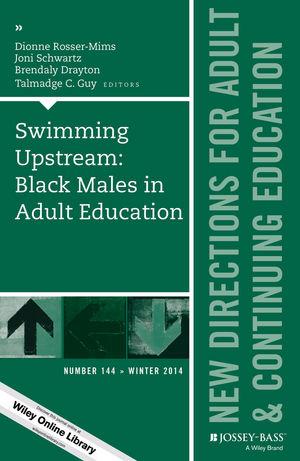
Click Here for Book Review Abstract: Here is an introduction to salient topics and issues affecting Black males as they engage in adult basic education programs, pursue employment, and obtain higher education. The chapters include academic research as well as program descriptions and personal narratives with a concern for the “lived experiences” and the voices of the men. While not exhaustive, this volumne does hope to challenge commonly held stereotypes, interactions, and policies. It is designed to raise questions about the unique experiences of this specific population and to explore the sociocultural dynamics that impact their education. This is the 144th volume of the Jossey Bass series New Directions for Adult and Continuing Education. Noted for its depth of coverage, it explores issues of common interest to instructors, administrators, counselors, and policymakers in a broad range of education settings, such as colleges and universities, extension programs, businesses, libraries, and museums. (From the Publisher)
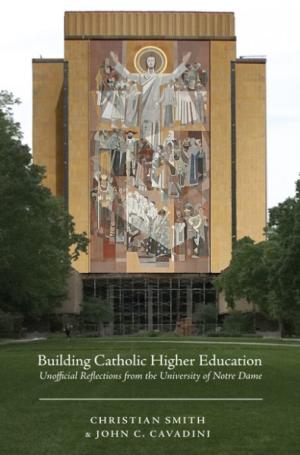
Click Here for Book Review Abstract: American Catholic universities and colleges are wrestling today with how to develop in ways that faithfully serve their mission in Catholic higher education without either secularizing or becoming sectarian. Major challenges are faced when trying to simultaneously build and sustain excellence in undergraduate teaching, strengthen faculty research and publishing, and deepen the authentically Catholic character of education. This book uses the particular case of the University of Notre Dame to raise larger issues, to make substantive proposals, and thus to contribute to a national conversation affecting all Catholic universities and colleges in the United States (and perhaps beyond) today. Its arguments focus particularly on challenging questions around the recruitment, hiring, and formation of faculty in Catholic universities and colleges. (From the Publisher)

Click Here for Book Review Abstract: Edited collection featuring essays from exceptional National Teaching Fellows. Presents the cutting-edge of pedagogical thinking on the most important topics in higher education today, including student engagement, assessment, internationalisation and employability. Destined to become a 'must-read' guide for anyone involved in higher education. (From the Publisher)
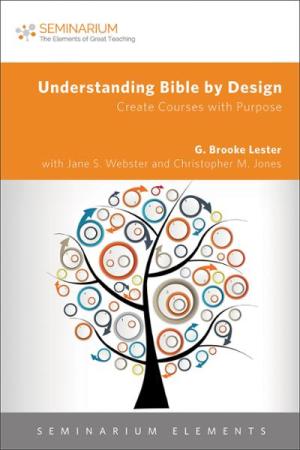
Click Here for Book Review Abstract: Today’s seminary and religious-education instructors are expected to design and redesign their courses more nimbly than in the past. We have to adapt our courses to novel learning environments, for more diverse learners, toward more diverse vocations. At the same time, institutional rewards for time invested in course design are fewer than ever. Understanding Bible by Design introduces the reader to Understanding by Design: an approach to course design that is proven time-efficient and grounded in the instructor’s most closely-held convictions about her subject matter’s “big ideas and essential questions.” This book’s contributors (one in Old Testament, one in New Testament, and one in Jewish Studies) demonstrate the value of Understanding Bible by Design for the Biblical Studies instructor, whether at seminary or university, face-to-face or online, from the intimate seminar to the massive MOOC. Lester’s synopsis of course design and suggested action is followed by a collaborative dialogue with Jane S. Webster and Christopher M. Jones. Webster and Jones provide practical commentary regarding the successful implementation of Lester’s proposed approaches. As a group, Lester, Webster, and Jones create a text that extends pedagogical innovation in inspiring but practical ways. (From the Publisher)
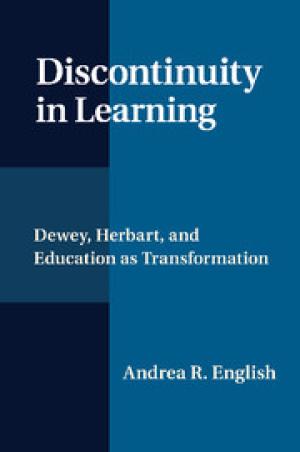
Click Here for Book Review Abstract: In this groundbreaking book, Andrea English challenges common assumptions by arguing that discontinuous experiences, such as uncertainty and struggle, are essential to the learning process. To make this argument, Dr English draws from the works of two seminal thinkers in philosophy of education - nineteenth-century German philosopher J. F. Herbart and American pragmatist John Dewey. English's analysis considers Herbart's influence on Dewey, inverting the accepted interpretation of Dewey's thought as a dramatic break from modern European understandings of education. Three key concepts - transformational learning, tact in teaching, and perfectibility - emerge from this analysis to revitalize our understanding of education as a transformational process. Dr English's comparative approach interweaves European and Anglo-American traditions of educational thought with a contemporary scholarly perspective, contributing to a work that is both intellectually rewarding and applicable to a classroom setting. The result is a book that is essential reading for philosophers and scholars of education, as well as educators. (From the Publisher)